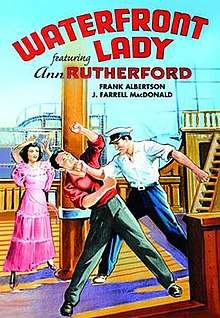
Lester Alvin Burnett, better known as Smiley Burnette, was an American country music performer and a comedic actor in Western films and on radio and TV, playing sidekick to Gene Autry, Roy Rogers, and other B-movie cowboys. He was also a prolific singer-songwriter who is reported to have played proficiently over 100 musical instruments, sometimes more than one simultaneously. His career, beginning in 1934, spanned four decades, including a regular role on CBS-TV's Petticoat Junction in the 1960s.

Francis Healey Albertson was an American actor who had supporting roles in films such as It's a Wonderful Life (1946) and Psycho (1960).

Chamber of Horrors is a 1966 American psychological horror film directed by Hy Averback and starring Patrick O'Neal, Cesare Danova, Wilfrid Hyde-White, Wayne Rogers and Laura Devon. The screenplay is by Stephen Kandel, from a story by Kandel and Ray Russell.

The Rains of Ranchipur is a 1955 American drama and disaster film made by 20th Century Fox. It was directed by Jean Negulesco and produced by Frank Ross from a screenplay by Merle Miller, based on the 1937 novel The Rains Came by Louis Bromfield. The music score was by Hugo Friedhofer and the cinematography by Milton Krasner.

John Farrell MacDonald was an American character actor and director. He played supporting roles and occasional leads. He appeared in over 325 films over a four-decade career from 1911 to 1951, and directed forty-four silent films from 1912 to 1917.
Handel's Last Chance is a 1996 television film created by David Devine and Richard Mozer for HBO Original Films of New York and directed by Milan Cheylov. A Canadian-Slovakian co-production, it stars Leon Pownall, Tod Fennell, Gerard Parkes, and Seana McKenna. It follows the fictional background of the premiere performance of George Frideric Handel's Messiah in 1742, where a Dublin street boy aids the composer with his singing talent, and the composer in turn changes the boy's life by bringing out his conscience and self-confidence.
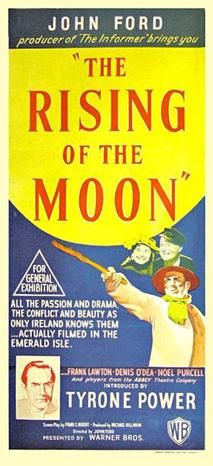
The Rising of the Moon is a 1957 Irish anthology film directed by John Ford. It consists of three episodes all set in Ireland:
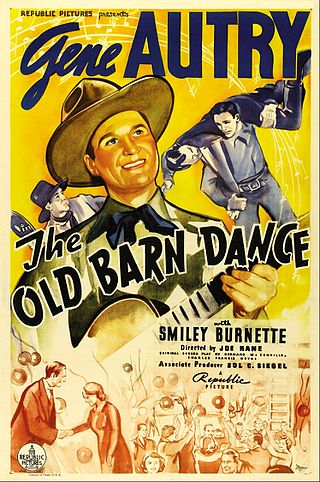
The Old Barn Dance is a 1938 American Western film directed by Joseph Kane and starring Gene Autry, Smiley Burnette, Joan Valerie, and written by Bernard McConville and Charles F. Royal.
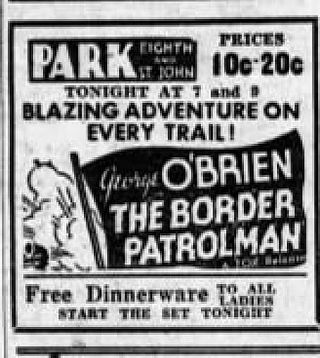
The Border Patrolman is a 1936 American Western film directed by David Howard and starring George O'Brien.
Kind Lady is a 1935 American drama film directed by George B. Seitz starring Aline MacMahon, Basil Rathbone and Mary Carlisle. It is based on the play of the same name by Edward Chodorov and a short story called The Silver Mask by Hugh Walpole.

Springtime in the Rockies is a 1937 American Western film directed by Joseph Kane and starring Gene Autry, Smiley Burnette, and Polly Rowles. Written by Gilbert Wright and Betty Burbridge, the film is about a ranch owner who brings a flock of sheep into cattle country and faces the opposition of local ranchers with the help of her ranch foreman.
Round-Up Time in Texas is a 1937 American Western film directed by Joseph Kane and written by Oliver Drake. The film stars Gene Autry, Smiley Burnette, and Maxine Doyle. Despite its title, the majority of the film takes place in South Africa.

Melody Trail is a 1935 American Western film directed by Joseph Kane and starring Gene Autry, Ann Rutherford, and Smiley Burnette. Written by Sherman L. Lowe and Betty Burbridge, the film is about a singing cowboy who goes after the men who kidnapped the baby he should have been babysitting. The film features the songs "On the Melody Trail", "A Lone Cowboy on the Lone Prairie", and "Western Lullaby".

The Sagebrush Troubadour is a 1935 American Western film directed by Joseph Kane and starring Gene Autry, Barbara Pepper, and Smiley Burnette. Written by Oliver Drake and Joseph F. Poland, the film is about two Texas Rangers traveling undercover as western troubadours in search of the killer of an old, half-blind man.

Western Jamboree is a 1938 American Western musical film directed by Ralph Staub and starring Gene Autry, Smiley Burnette, and Jean Rouverol. Based on a story by Patricia Harper, the film is about a singing cowboy who goes up against a gang of outlaws who are looking to steal the valuable helium gas beneath the cowboy's ranch.
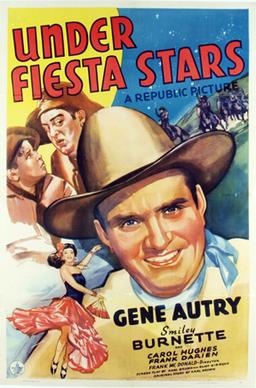
Under Fiesta Stars is a 1941 American western film directed by Frank McDonald and starring Gene Autry, Smiley Burnette, and Carol Hughes. Based on a story by Karl Brown, the film is about a singing cowboy and rodeo champion who inherits a ranch and mining property along with his foster father's niece. She wants to sell but needs his consent, and he wants to work the mine according to his foster father's wishes. Problems arise when the niece unwittingly gets involved with unscrupulous lawyers who are plotting to steal the mine. The film features the songs "Purple Sage in the Twilight", "When You're Smiling", and the title song.

Bells of Capistrano is a 1942 American Western film directed by William Morgan and starring Gene Autry, Smiley Burnette, and Virginia Grey. Written by Lawrence Kimble, it is a story of a singing cowboy who helps out a beautiful rodeo owner when her competitor gets too rough. The film features the popular songs "Forgive Me", "At Sundown", "In Old Capistrano", and "Don't Bite The Hand That's Feeding You". Bells of Capistrano was Autry's final film before entering the service for World War II.
No Place for a Lady is a 1943 black and white mystery film, directed by James P. Hogan. It was followed by a second Jess Arno film, The Devil's Henchman.

Inside Job is a 1946 American crime film noir directed by Jean Yarbrough starring Preston Foster, Ann Rutherford, Alan Curtis and Milburn Stone.
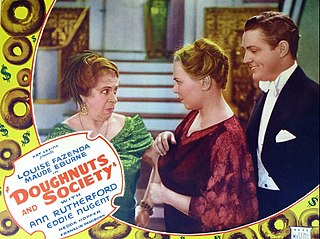
Doughnuts and Society is a 1936 American comedy film directed by Lewis D. Collins and written by Karen DeWolf, Robert St. Claire, Wallace MacDonald, Matt Brooks and Gertrude Orr. The film stars Louise Fazenda, Maude Eburne, Ann Rutherford, Edward Nugent, Hedda Hopper and Franklin Pangborn. The film was released on March 27, 1936, by Republic Pictures.
